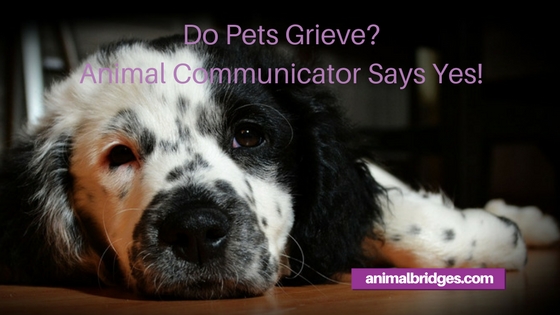Do pets grieve? From my experience as a pet parent and an animal communicator, I say yes pets grieve.
What does it mean to grieve?
According to Merriam-Webster Dictionary, the definition of grieve is:
- To cause to suffer: DISTRESS it grieves me to see him this way
- To feel or show grief over grieving the death of her son
Maybe you saw these signs in your pet. I have.
When do pets grieve? Pets grieve when:
- A family member is suddenly gone for an extended period of time. Examples: camp, business trips, vacation, college, unusual schedule changes, hospitalization, etc.
- The family isn’t able to keep her and takes her to a rescue.
- A family doesn’t train their dog and abandons him.
- Her pet parent is not healthy enough to care for her, goes to a nursing home, or sadly dies.
- One family pet is suddenly gone and remaining pet is confused and stressed.
As an animal communicator, I’ve talked to many cats, dogs, and other animals that were very upset because their best friend is gone.
One client’s dog spent over a week at vet hospital. When I spoke to Buddy, his best friend, his first words to me were “Is Murphy dead?” I explained Murphy had a serious illness and surgery. Buddy accepted this and understood when Murphy was coming home. Buddy started eating again and stopped showing signs of stress.
Recently a cat, Miller, was very ill and spent over a week at the vet’s clinic. Unfortunately he crossed The Rainbow Bridge before coming home. His pet parent realized his other cat, Jackson, was grieving too. Gary asked me to talk with Jackson.
Immediately Jackson said: “Where is Miller? I can’t find Miller. I think something happened … Where is Miller?” I explained Miller was very sick and crossed The Rainbow Bridge. Immediately Miller said, “Thank you for telling me.”
How to help your grieving pet
- Tell your pet what is happening.
- Have someone check in with the remaining pet.
- Ease the emotions of fear and concern with Bach Rescue® Remedy – both of you can use it!
- If possible, spend more time with your pet.
- Schedule an animal communication with me and learn what your pets want you to know.
Remember I’m here to help you and your pet at any stage of life.






Thank you for your insight and valuable tips. Pet grief is so often overlooked. It can be difficult for them, and we can help them through it.
As the pet parent to Buddy and Murphy mentioned above, I can say for certain that all you have written is true. Your communications with Buddy and Murphy, as well as your advice on what to do, helped more than once. When Buddy was transitioning and crossed the Rainbow Bridge last year, Murphy was able to grieve less and move through the process faster.
I’m glad you have shared your talents, skills and wisdom with us. And I’m glad to be able to pass it on to friends and to my clients to help them as well.
Thank you Penny. Thank you for sharing Buddy and Murphy’s stories to help others.
I have two Great Danes. Our matriarch is am almost 9 year old rescued Dane named Zora. Our “baby” is almost 2 year old male, Dodo.
Zora is a force of nature. We were lucky enough to rescue her from a hoarding situation at age 1. She’s weathered many storms including crappy genetics and early maltreatment. Zora required a laminectomy at 4 years for a vertebral malformation- she was given a poor prognosis but powered back to 95% of her previous vigor.
Then, last spring, we found a gingival mass that was biopsied and found to be squamous cell cancer. We evaluated all options but, ultimately, decided to go the palliative route. Two different veterinary practices told us to expect her to be gone by summer’s end. Zora had a different idea and, somehow (none of the docs know why), managed to shrink and, finally, completely clear the tumor.
Then, in fall, while romping at the dog park, Zora pulled her shoulder tendon. The orthopedist ordered she be on strict exercise restriction for weeks if there was to be any chance for recovery. For 7 weeks, we kept the poor dog quiet but for short, leashed walks into the back yard to potty. She initially pouted when Dodo and I would leave for the dog park. Later, she whined in a way that broke my heart. Finally, as our girl showed minimal to no improvement, it seemed she had finally reached her endpoint. I decided to give her a few final happy days – she joined Dodo ( and her other canine buddies ) for what I assumed would be a few, likely paimful, last romps.
And, in true Zora fashion, that old girl pulled another trick out of her bag. After her first dog park session in almost 2 months, her limp was decreased and her mood was amazing. (She woke up several times that night, gave me “kisses,” and went back to sleep). After the 3rd trip in as many days, the limp was imperceptible. Months later, our girl is hanging in there – living each day to its fullest.
I am quite aware tthat even though I sometimes theorize that Zora will outlive us all, the likelihood of that is slight. Most of all, I am overwhelmingly grateful for the time she has been a part of my life.
The concern that I have now is how Zora’s eventual passing will affect our baby, Dodo. Also a rescue, he came from a southern puppy mill. He came to us at 4 months, the most frightened pup I’ve ever known. He was the largest pup in the rescued litter, but also the one most likely to be “picked on” by his litter mates. The vet believes that an early fracture involving the tibial growth plate ( several pups in the litter had fractures ) caused his angular limb disorder. So this sensitive boy was further traumatized by a complex surgery at 5 months followed by weeks of recovery (including pins and external fixators) and a nasty infection.
) caused his angular limb disorder. So this sensitive boy was further traumatized by a complex surgery at 5 months followed by weeks of recovery (including pins and external fixators) and a nasty infection.
The constant throughout this difficult time for Dodo was our love and Zora’s presence. He is absolutely bonded to her- I really believe he thinks she is his mother. He takes his behavioral cues from her and is much less “brave” when she is not around.
It pains me (evidence/science based person that I am) to ask if I should be “preparing” Dodo for what I know will likely happen sooner than later? I mean no disrespect- I accept everyone’s right to believe and do what feels right for them— and I strongly feel that my pets are sentient beings with emotional needs and awareness— I just struggle with how anyone can be sure what a non verbally communicative being is truly feeling or understanding. Again, I apologize for my skeptical nature and thank you for your time.
Holly, I understand your missing evidence. More than likely you answered the phone and knew it was someone. You know when your dog is sick by looking at her or sense something is wrong.
Everyone has intuition. Some have developed it more. Please read my blog about Carmella, the dog who was licking. On the blog search Carmella. There is now way I knew any of the information she was telling me. Her client called me and said “We have to talk.” Then the rest of the story unfolded.
Even Einstein talks about intuition as described in this blog http://bit.ly/AnimBridEinstein. This documentary (YouTube) on Ana Breytenbach, an animal communicator. Her story about the leopard is amazing. http://bit.ly/AnimBridAnnaBreytenbach
I’d be very happy to talk with you about intuition and animal communication.